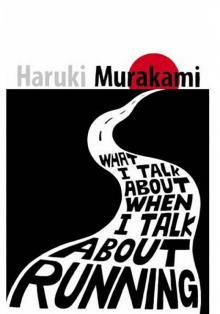- Home
- Haruki Murakami
Sputnik Sweetheart Page 17
Sputnik Sweetheart Read online
Page 17
“You’re pretty young for a teacher, aren’t you?” he said. “How long have you been teaching?”
I pretended to think it over, and answered, “Three years.”
“Hmm,” he said. And didn’t say anything else. But the silence spoke volumes. He picked up my card and looked at my name again, as if rechecking something.
“My name’s Nakamura, I’m the chief of security here,” he introduced himself. He didn’t proffer a business card of his own. “Just pull up a chair from over there if you would. I’m sorry about how hot it is. The air conditioner’s on the blink, and no one will come out to fix it on a Sunday. They aren’t nice enough to give me a fan, so I sit and suffer. Take off your jacket if you’d like. We might be here for a while, and it makes me hot just looking at you.”
I did as he told me, pulling over a chair and removing my jacket. My sweaty shirt clung to my skin.
“You know, I’ve always envied teachers,” the guard began. A stillborn smile played around his lips, yet his eyes remained those of a deep-sea predator, searching my depths for the slightest movement. His words were polite enough, but that was only a veneer. The word teacher sounded like an insult.
“You have over a month off in the summer, don’t have to work on Sundays or at night, and people give you gifts all the time. Pretty nice life if you ask me. I sometimes wish I’d studied harder and become a teacher myself. Destiny intervened and here I am—a security guard at a supermarket. I wasn’t smart enough, I suppose. But I tell my kids to grow up to be teachers. I don’t care what anybody says, teachers have it made.”
My girlfriend had on a simple blue half-sleeve dress. Her hair was piled up neatly on top of her head, and she had on a pair of small earrings. White sandals with heels completed her outfit, and a white bag and small cream-colored handkerchief rested on her lap. It was the first time I’d seen her since I got back from Greece. She looked back and forth between me and the guard, her eyes puffy from crying. She’d been through a lot, it was clear.
We exchanged a quick glance, and I turned to her son. His name was Shin’ichi Nimura, but his classmates had nicknamed him Carrot. With his long, thin face and his shock of unkempt, curly hair, the name fit. I usually called him that, too. He was a quiet boy, hardly ever speaking more than was necessary. His grades weren’t bad; he rarely forgot to bring his homework and never failed to do his share of the cleaning up. Never got into trouble. But he lacked initiative and never once raised his hand in class. Carrot’s classmates didn’t dislike him, but he wasn’t what you’d call popular. This didn’t please his mother much, but from my point of view he was a good kid.
I assume you’ve heard about what happened from the boy’s mother,” the security guard said.
“Yes, I have,” I replied. “He was caught shoplifting.”
“That’s correct,” the guard said, and set a cardboard box that was at his feet on top of the table. He pushed it toward me. Inside was a collection of identical small staplers still in their packaging. I picked one up and examined it. The price tag said ¥850.
“Eight staplers,” I commented. “Is this all?”
“Yep. That’s the lot of it.”
I put the stapler back in the box. “So the whole thing would come to sixty-eight hundred yen.”
“Correct. Sixty-eight hundred yen. You’re probably thinking, ‘Well, OK, he shoplifted. It’s a crime, sure, but why get so bent out of shape over eight staplers? He’s just a schoolkid.’ Am I right?”
I didn’t reply.
“It’s OK to think that. ’Cause it’s the truth. There are a lot worse crimes than stealing eight staplers. I was a policeman before I became a security guard, so I know what I’m talking about.”
The guard looked directly into my eyes as he spoke. I held his gaze, careful not to appear defiant.
“If this were his first offense, the store wouldn’t raise such a fuss. Our business is dealing with customers, after all, and we prefer not to get too upset over something small-scale like this. Normally I’d bring the child here to this room, and I’d put a little of the fear of God into him. In worse cases we’d contact the parents and have them punish the child. We don’t get in touch with the school. That’s our store’s policy, to take care of children shoplifting quietly.
“The problem is this isn’t the first time this boy’s shoplifted. In our store alone, we know he’s done it three times. Three times! Can you imagine? And what’s worse is both other times he refused to give us his name or the name of his school. I was the one who took care of him, so I remember it well. He wouldn’t say a word, no matter what we asked. The silent treatment, we used to call it on the police force. No apologies, no remorse, just adopt a crummy attitude and stonewall it. If he didn’t tell me his name this time, I was going to turn him over to the police, but even this didn’t raise a reaction. Nothing else to do, so I forced him to show me his bus pass, and that’s how I found out his name.”
He paused, waiting for it all to sink in. He was still staring fixedly at me, and I continued to hold his gaze.
“Another thing is the kind of things he stole. Nothing cute about it. The first time he stole fifteen mechanical pencils. Total value nine thousand seven hundred fifty yen. The second time it was eight compasses, eight thousand yen altogether. In other words, each time he just steals a pile of the same things. He’s not going to use them himself. He’s just doing it for kicks, or else he’s planning to sell them to his friends at school.”
I tried conjuring up a mental image of Carrot selling stolen staplers to his friends during lunch hour. I couldn’t picture it.
“I don’t quite understand,” I said. “Why keep stealing from the same store? Wouldn’t that just increase the chances you’d get caught—and worsen your punishment when you were? If you’re trying to get away with it, wouldn’t you normally try other stores?”
“Don’t ask me. Maybe he was stealing from other stores. Or maybe our store just happens to be his favorite. Maybe he doesn’t like my face. I’m just a simple security guard for a supermarket, so I’m not going to think out all the ramifications. They don’t pay me enough for that. If you really want to know, ask him yourself. I hauled him in here three hours ago and not a peep so far. Pretty amazing. Which is why I dragged you in here. I’m sorry you had to come in on your day off. . . . One thing I’ve been wondering about since you came in, though. You look so tanned. Not that it’s relevant, but did you go someplace special during your summer vacation?”
“No, no place special,” I replied.
Even so, he continued to scrutinize my face carefully, as if I were an important piece in the puzzle.
I picked up the stapler again and examined it in detail. Just an ordinary, small stapler, the kind you’d find in any home or office. An office supply about as cheap as they come. Seven Star cigarette dangling from his lips, the security guard lit it with a Bic lighter and, turning to one side, blew out a cloud of smoke.
I turned to the boy and gently asked, “Why staplers?”
Carrot had been staring the whole time at the floor but now quietly lifted his face and looked at me. But he didn’t say anything. I noticed for the first time that his expression was completely changed—strangely emotionless, eyes out of focus. He seemed to be staring into a void.
“Did somebody bully you into doing it?”
Still no answer. It was hard to tell if my words were getting through. I gave up. Asking the boy anything at this point wasn’t going to be productive. His door was closed, the windows shut tight.
“Well, sir, what do you propose we do?” the guard asked me. “I get paid to make my rounds of the store, check the monitors, catch shoplifters, and bring them back to this room. What happens afterward is another matter entirely. Especially hard to deal with when it’s a child. What do you suggest we do? I’m sure you’re more knowledgeable in this area. Should we just let the police handle the whole thing? That would certainly be easier for me. Keep us from wasting our time when
we’re just treading water anyway.”
Actually, at that moment I was thinking about something else. This dumpy little supermarket security room reminded me of the police station on the Greek island. Thoughts of which led straight to Sumire. And the fact that she was gone.
It took me a few moments to figure out what this man was trying to say to me.
“I’ll let his father know,” Carrot’s mother said in a monotone, “and make sure my son knows in no uncertain terms that shoplifting is a crime. I promise he won’t ever bother you again.”
“In other words you don’t want this to be taken to court. You’ve said that over and over,” the security guard said in a bored tone. He tapped his cigarette on the ashtray, flicking the ash into it. He turned to me again and said, “But from where I sit, three times is just too many. Somebody’s gotta put a stop to it. What are your feelings about this?”
I took a deep breath, pulling my thoughts back to the present. To the eight staplers and a Sunday afternoon in September.
“I can’t say anything unless I talk to him,” I replied. “He’s a smart boy, and he’s never caused any problems before. I have no clue why he’d do something so dumb, but I’m going to spend time myself and get to the bottom of this. I really apologize for all the trouble he’s caused.”
“Yeah, but I just don’t get it,” the guard said, frowning behind his glasses. “This boy—Shin’ichi Nimura?—he’s in your homeroom, right? So you see him every day, correct?”
“That’s right.”
“He’s in fourth grade, which means he’s been in your class for a year and four months. Am I right?”
“Yes, that’s correct. I’ve been in charge of his class since they were in third grade.”
“And how many pupils are in your class?”
“Thirty-five.”
“So you can keep an eye on them all. You’re telling me you never had any hint that this boy was going to cause trouble. No sign at all?”
“That’s right.”
“Wait a sec—as far as we know, he’s been shoplifting for half a year. Always alone. Nobody’s forcing him to do it. And it’s not spur of the moment. And he’s not doing it for the money either. According to his mother he gets a generous allowance. He’s doing it just to get away with stealing. This boy has problems, in other words. And you’re telling me there wasn’t any indication of this whatsoever?”
“I’m speaking as a teacher here,” I replied, “but especially with children, habitual shoplifting is not so much a criminal act as the result of a subtle emotional imbalance. Maybe if I’d paid a little more attention I would have noticed something. I fell down on the job, definitely. But with emotionally disturbed children there’s not always something outward to go on. If you separate the act from everything else and punish the child, the basic problem isn’t going to be cured. Unless you find the fundamental cause and treat that, the same problem will surface later on in a different form. Often children are trying to send a message by shoplifting, so even if it isn’t the most efficient way of handling the problem, it’s important to take the time to talk things out.”
The guard crushed out his cigarette and, mouth half open, stared at me for the longest time, like I was some odd-looking animal. His fingers resting on the tabletop were terribly thick, like ten little furry black creatures. The more I looked at them, the harder I found it to breathe.
“Is that what they teach you in college, in pedagogy, or whatever you call it?”
“Not necessarily. It’s basic psychology. You can find it in any book.”
“You can find it in any book,” he said, repeating my words listlessly. He picked up his hand towel and wiped away the sweat from his thick neck.
“ ‘A subtle emotional imbalance’—what’s that supposed to mean? When I was a policeman, I spent every day, morning till night, dealing with characters who were imbalanced, all right. But nothing subtle about it. The world’s full of people like that. A dime a dozen. If I wanted to spend the time to listen to each and every one of the messages those people were sending out, I’d need ten more brains. And that still wouldn’t be enough.”
He sighed, and placed the box of staplers back under the desk.
“OK—you’re absolutely right. Children have pure hearts. Corporal punishment is bad. People are all equal. You can’t judge people by their grades. Take the time to talk and figure out a solution. I don’t have a major problem with that. But do you think that’s how the world will get to be a better place? No way. It’ll only get worse. How can people all be equal? I’ve never heard such a thing. Consider this—one hundred and ten million people are elbowing one another out of the way every day in Japan. Try making all of them equal. It’d be hell on earth.
“It’s easy to say all these sweet words. Close your eyes, pretend not to see what’s going on, and pass the buck. Don’t make any waves, sing ‘Auld Lang Syne,’ hand the kids their diplomas, and everybody lives happily ever after. Shoplifting is a child’s message. Don’t worry about later on. That’s the easy way out, so why not? But who’s going to clean up the mess? People like me, that’s who. You think we do this because we like it? You guys have this kind of hey-what’s-sixty-eight-hundred-yen? look on your faces, but think about the people he stole from. A hundred people work here, and you better believe they take a difference of one or two yen seriously. When they tote up the receipts for a cash register and there’s a hundred-yen discrepancy, they work overtime to straighten it out. Do you know how much per hour the women who work the checkout counters make here? Why don’t you teach your pupils that?”
I didn’t say anything. Carrot’s mother was silent, as was the boy. The security guard had worn himself out talking and sank back into the general silence. In another room a phone rang, and someone picked it up on the first ring.
“So, what should we do?” he asked.
I said, “How about we string him upside down from the ceiling until he says he’s sorry?”
“I like it! Course you know that we’d both be out on our ears.”
“Well, then, the only thing we can do is patiently take the time to discuss the problem. That’s all I can say.”
A person from another room knocked at the door and entered. “Mr. Nakamura, could you lend me the key to the storage room?” he asked. Mr. Nakamura rummaged through the drawer in his desk for a while but couldn’t find it. “It’s gone,” he said. “That’s strange. I always keep it in here.” “It’s very important,” the other man said. “I need it right away.” The way the two of them talked about it, it sounded like a very important key, something that probably shouldn’t have been kept in that drawer to begin with. They rifled through every drawer but came up empty-handed.
The three of us just sat there while this was going on. A couple of times Carrot’s mother glanced at me beseechingly. Carrot sat as before, expressionless, eyes pinned to the ground. Pointless, random thoughts flashed through my head. The room was stifling.
The man who needed the key gave up, grumbling as he left.
“That’s enough,” Mr. Nakamura said, turning to us; in a toneless, matter-of-fact voice he continued: “Thank you for coming. We’re finished here. I’ll leave the rest up to you and the boy’s mother. But get one thing clear—if he does this one more time, he won’t get off this easy. You do understand that, I hope? I don’t want any trouble. But I do have to do my job.”
She nodded, and so did I. Carrot looked like he hadn’t heard a word. I stood up, and the two of them weakly followed suit.
“One last thing,” the security guard said, still seated. He looked up at me. “I know this is rude of me, but I’ll just go ahead and say it. Since I laid eyes on you there’s something just not quite right. You’re young, tall, make a good impression, nicely tanned, logical. Everything you say makes absolute sense. I’m sure the parents of your pupils like you a lot. I can’t really explain it, but since I first saw you something’s been gnawing at me. Something I just can’t swallow. Noth
ing personal, so don’t get angry. It’s just, something bothers me. But what is it that’s gnawing at me, I wonder?”
“Would you mind if I ask you something personal?” I said.
“Ask away.”
“If people aren’t equal, where would you fit in?”
Mr. Nakamura took a deep lungful of cigarette smoke, shook his head, and exhaled ever so slowly, as if he were forcing someone to do something. “I don’t know,” he replied. “Don’t you worry, though. The two of us won’t be sharing the same level.”
She’d parked her red Toyota Celica in the parking lot of the supermarket. I called her over to one side, away from her son, and told her to go on home alone. I need to talk to your son alone for a while, I said. I’ll bring him home later. She nodded. She was about to say something but didn’t, got in her car, took her sunglasses from her purse, and started the engine.
After she left I took Carrot to a cheerful-looking little coffee shop I noticed nearby. I relaxed in the air-conditioning, ordered an iced tea for myself and an ice cream for the boy. I undid the top button of my shirt, took off my tie, and slipped it into my jacket pocket. Carrot remained sunk in silence. His expression and the look in his eyes were unchanged from when we were in the security office. He looked completely blank, like he was going to be that way for a while. His small hands placed neatly in his lap, he looked down at the floor, averting his face. I drank my iced tea, but Carrot didn’t touch his ice cream. The ice cream slowly melted in the dish, but he didn’t seem to notice. We sat facing each other like some married couple sharing an awkward silence. Every time she stopped by our table, the waitress looked tense.
Things just happen,” I finally said. I wasn’t trying to break the ice. The words just came bubbling up.

 Sputnik Sweetheart
Sputnik Sweetheart Dance Dance Dance
Dance Dance Dance The Wind (1) and Up Bird Chronicle (2)
The Wind (1) and Up Bird Chronicle (2) Blind Willow, Sleeping Woman
Blind Willow, Sleeping Woman Absolutely on Music: Conversations With Seiji Ozawa
Absolutely on Music: Conversations With Seiji Ozawa Norwegian Wood
Norwegian Wood South of the Border, West of the Sun
South of the Border, West of the Sun Kafka on the Shore
Kafka on the Shore Men Without Women
Men Without Women After Dark
After Dark Hard-Boiled Wonderland and the End of the World
Hard-Boiled Wonderland and the End of the World 1q84
1q84 The Wind-Up Bird Chronicle
The Wind-Up Bird Chronicle Underground: The Tokyo Gas Attack and the Japanese Psyche
Underground: The Tokyo Gas Attack and the Japanese Psyche Vintage Murakami
Vintage Murakami The Elephant Vanishes: Stories
The Elephant Vanishes: Stories Colorless Tsukuru Tazaki and His Years of Pilgrimage
Colorless Tsukuru Tazaki and His Years of Pilgrimage First Person Singular
First Person Singular After the Quake
After the Quake A Wild Sheep Chase
A Wild Sheep Chase What I Talk About When I Talk About Running
What I Talk About When I Talk About Running Birthday Girl
Birthday Girl The Elephant Vanishes
The Elephant Vanishes Norwegian Wood (Vintage International)
Norwegian Wood (Vintage International) Wind/Pinball
Wind/Pinball Norwegian Wood Vol 1.
Norwegian Wood Vol 1. Underground
Underground Colorless Tsukuru Tazaki and His Years of Pilgrimage: A novel
Colorless Tsukuru Tazaki and His Years of Pilgrimage: A novel Killing Commendatore
Killing Commendatore Absolutely on Music
Absolutely on Music